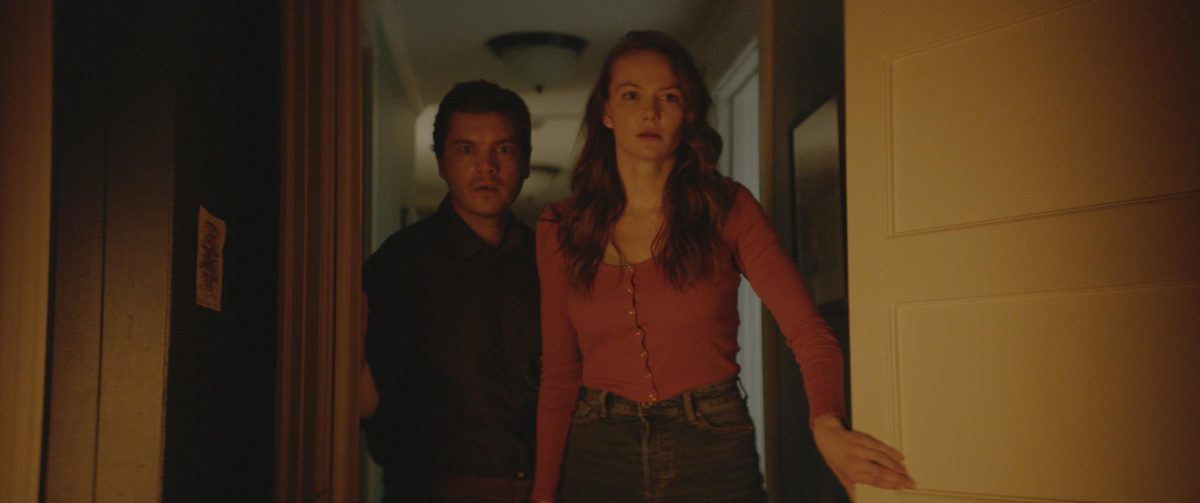What to Watch Verdict
'Son' is a horror story from a mother's perspective that becomes more engaging as what we perceive to be the film's reality becomes an ensnaring and divisive question mark.
Pros
- +
🩸 A twisty but not tangled narrative.
- +
🩸 Andi Matichak keeps us in suspense.
- +
🩸 Often saying more than we might initially perceive.
Cons
- -
🩸 Beholden to some predictable beats.
- -
🩸 The ending might throw some.
- -
🩸 Requires a certain patience.
In teeing up Son, I rewind to My Heart Can't Beat Unless You Tell It To. My Tribeca review of the latter laments a rather unemphatic vampire riff that doesn't do much with its Let The Right One In inspirations. Ivan Kavanagh's Son, alternatively, wades into psychological horrors that elevate this mother-son supernatural thriller. More importantly—as suggested by the mentioned ties to vampiric family tales—Kavanagh finds a way to present more than just feral kin and the caretaker who cleans after feeding frenzies. The introduction of cultist pursuers, lingering traumatic influences, and something more than just a sick, hungry monster is an encompassing nightmare—there's a meatier dramatic weight beyond gnarly midnight snacks.
Andi Matichak stars as single-mother Laura, who adores her parental blessing despite an opening flashback that contrasts such an opinion. David (Luke David Blumm) is a curious and sweetly polite young boy born from an unspeakable scenario and the lone link to a past that Laura struggles to leave behind. Then, one night, Laura opens David's bedroom door to catch multiple figures looming over her baby boy, and their hardships begin anew. She confides in policeman Paul (Emile Hirsch) that the cult she attempted to flee is now trying to steal her child, possibly for a summoning ritual—David interrupts by vomiting blood before a physical collapse.
The intrigue of Son is tethered to Laura's cultist upbringing, since her mental well-being remains in constant question. Kavanagh emphasizes perspective since the movie we see unfold is about an adolescent who requires bloodsucking and flesh-chewing to satiate his unique hunger, as told and seen by Laura. The townsfolk standing in her house (without signs of break-in) or David's unsightly eating habits have to be true because that's where Kavanagh points the audience—until Paul begins rifling through Laura's past. Events become more suspect when professionals contest the presence of a cult in Laura's tormented life, suggesting it's a mechanism to hide the lifelong remnants of her father's abusive actions. As a statement against gaslighting and how our minds protect ourselves from trauma, suspense reigns supreme at the expense of shattering reality.
A less commanding narrative might not sell the inherent wiliness of Son, mainly its focus on Laura's possible deterioration. Matichak's performance is both wounded and in charge, allowing Kavanagh to weave doubt into pseudo-vampire mythology that Laura's mental state could entirely fabricate. Emile Hirsch succeeds in playing a cop who both empathizes with a visibly disturbed victim of circumstance and questions the plausibility of a murder spree in the name of motherly love—Paul becomes our grounding factor. We can believe Laura's alibis and tear-soaked cries for help when Paul supports her in private, yet waver whenever Paul uncovers a new clue that frays another end of Laura's sanity. It's a balancing act that Kavanagh pulls off with enough polish and punishment; the endearing advantage Son holds above other films of this compassionate ilk.
The multifaceted horrors of Son become both obvious (corpse nomz) and subtle (Laura's claims). Glimpses of David gnawing apart some misogynistic, violent motel pimp coat gaudy bathroom tiles in a sludge of squirting blood, with chunky leftovers in full sight—Luke David Blumm nails the landing when juxtaposing David's boyhood innocence right after devouring an adult meal. Kavanagh does his best to throw a few jumps at the audience, such as David's distorted vision that startles Laura one night. Although, nothing out of haunted playbooks is scarier than Laura's experiences and how they shape her on-edge authenticity, primarily how others treat her while she sees either hallucinations or personal hellscapes of an antlered demon praised by the cult who may or may not even exist. It's more experiential horror than streamlined ghouls and creature carnage, which still find their inclusion without lacking ferocity (David's claws and fangs when his stomach growls become something worse).
Son is one of those sneakily evolving horror tales that doesn't adhere to convention. Ivan Kavanagh blends motherhood, lingering emotional scars, and craven cannibalistic appetites into this defiant ode to the horrors that pursue those failed by our society. A single mother pleads for help, the same help that she never received during her own tumultuous upbringing, and is pegged as just another crazy woman. More profound thematic unrest emerges from the pile of discarded limbs that builds as time passes, and that's the biggest surprise. Son could have gotten by on gore and dinnertime terror alone, but credit Kavanagh for capitalizing on richer, more flavorful narrative ambitions that consider horror's fullest package versus other more one-note attempts to tell similarly unsettling stories.
The latest updates, reviews and unmissable series to watch and more!
Matt Donato is a Rotten Tomatoes approved film critic who stays up too late typing words for What To Watch, IGN, Paste, Bloody Disgusting, Fangoria and countless other publications. He is a member of Critics Choice and co-hosts a weekly livestream with Perri Nemiroff called the Merri Hour. You probably shouldn't feed him after midnight, just to be safe.


